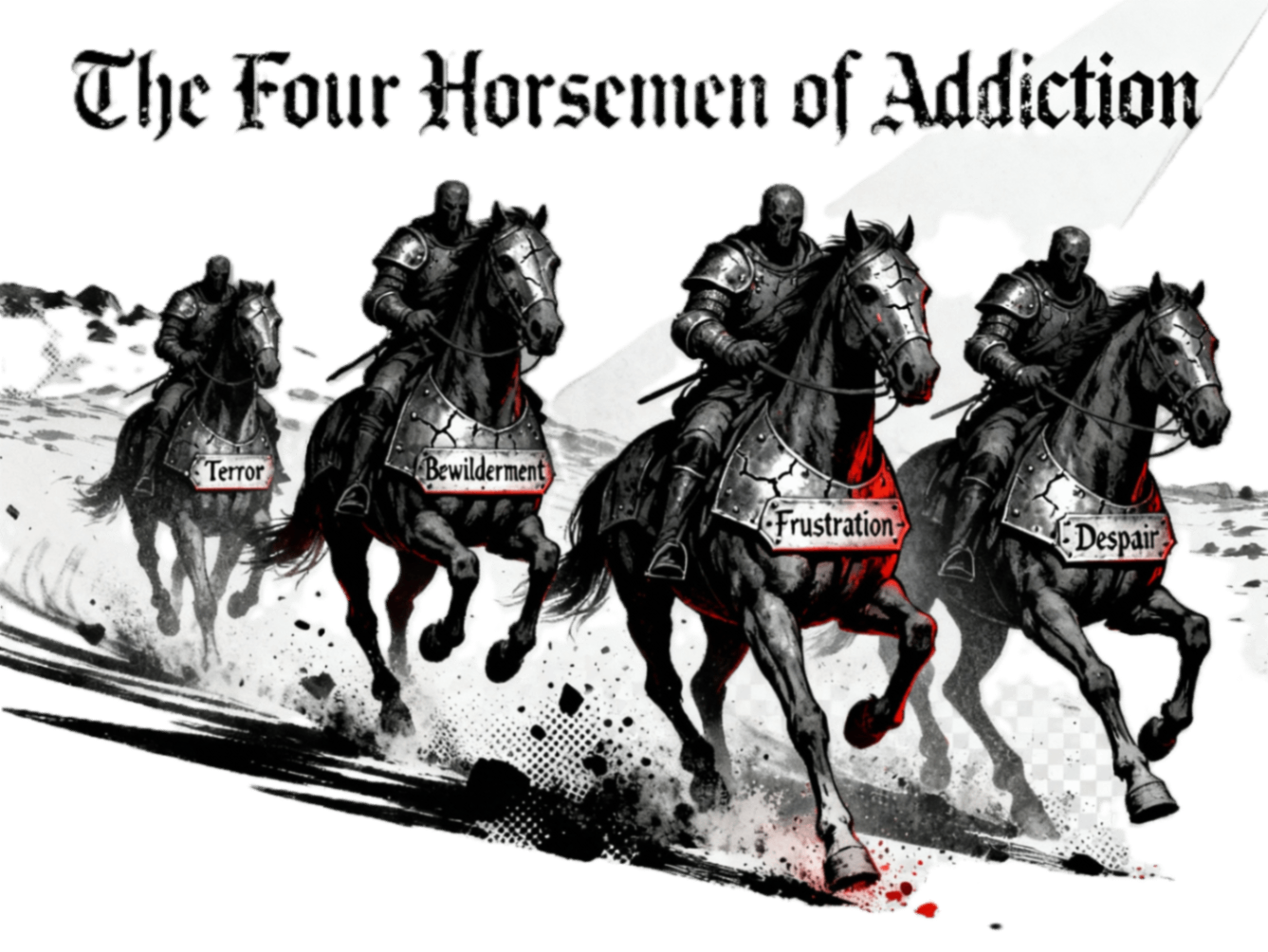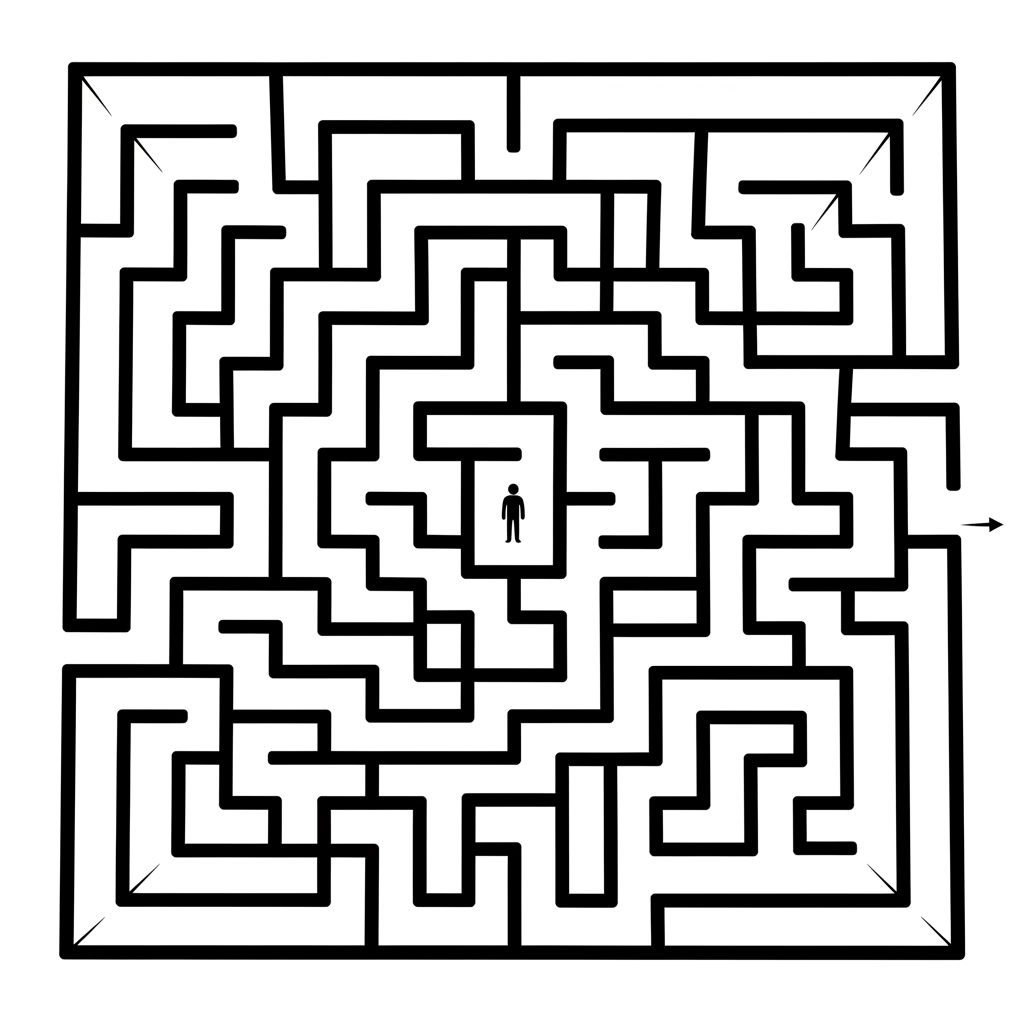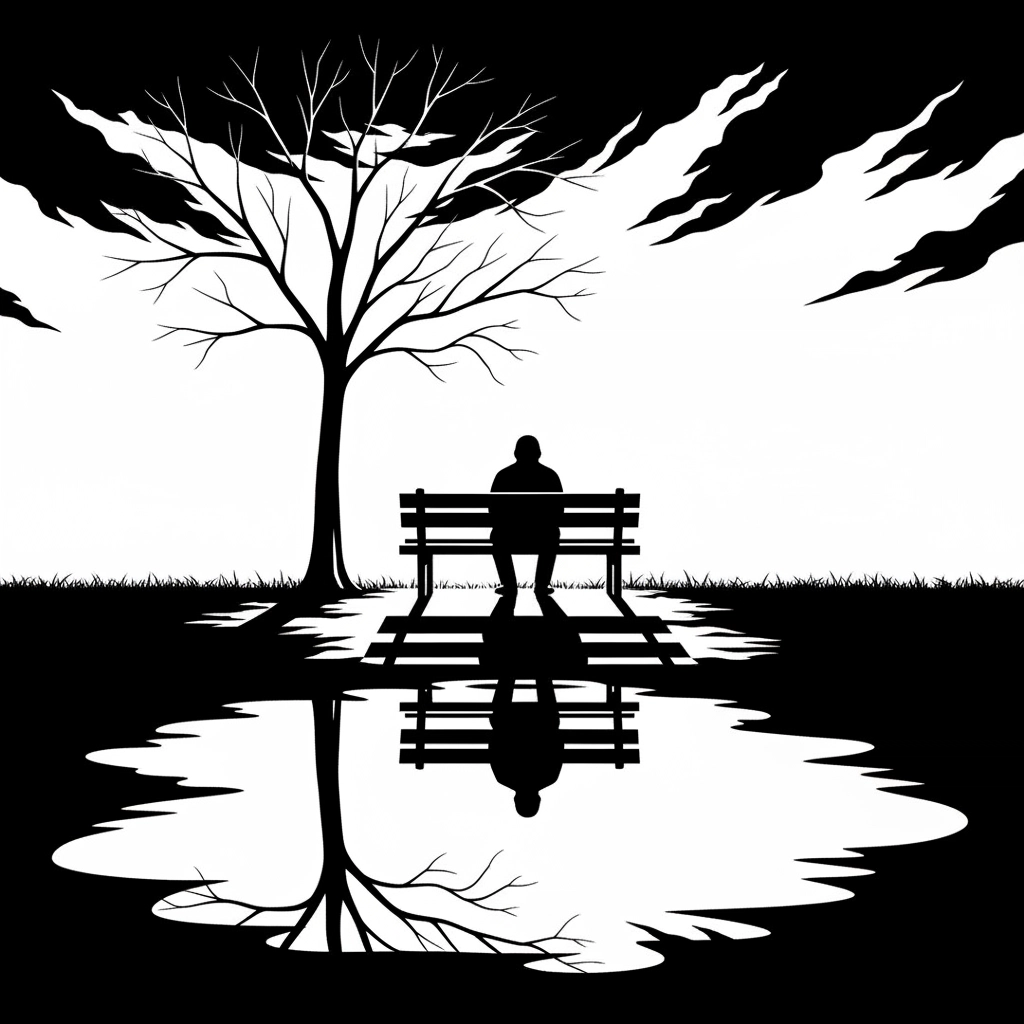"Terror, bewilderment, frustration, despair. These are the Four Horsemen." – AA Big Book, p.151
When I first read these words in the Big Book, something inside me stopped cold. There they were – four simple words that somehow captured the entire hurricane of emotions I'd been living with for years. These weren't just abstract concepts written on a page; they were the very forces that had been driving my life into the ground, one poor decision at a time.
The authors of Alcoholics Anonymous weren't being dramatic when they chose the imagery of horsemen. In the Book of Revelation, the Four Horsemen bring about the end times – conquest, war, famine, and death. For those of us in the grip of addiction, these four emotional states can feel just as apocalyptic, destroying everything we once held dear.
But here's what I've learned in my own journey: naming these horsemen is the first step toward taking their power away.
Terror: When Fear Becomes Everything
Terror was my constant companion long before I understood what it was. It showed up as the 3 AM panic attacks when I'd wake up trying to piece together what I'd done the night before. It was the cold sweat when my phone buzzed, wondering who I might have called or texted in a blackout. It was the overwhelming dread of facing another day knowing I'd probably repeat the same destructive patterns.
The Big Book describes this terror as the fear that comes when we realize we've lost control – not just of our drinking or using, but of our entire lives. It's the terror of knowing we're capable of things we never thought possible. For me, it was the terror of becoming someone I didn't recognize, someone who could lie effortlessly, hurt people I loved, and make promises I had no intention of keeping.
This terror doesn't just disappear when we get sober. Sometimes it shows up in early recovery as the fear of living without our substance of choice, or the fear that we've damaged relationships beyond repair. Learning to recognize this terror – and to sit with it without numbing it – has been one of my biggest challenges.

Bewilderment: Lost in the Maze of Our Own Making
Bewilderment is perhaps the most frustrating of the four horsemen because it's rooted in a complete inability to understand our own behavior. How many times did I wake up and ask myself, "Why did I do that again?" The bewilderment comes from the disconnect between our intentions and our actions.
I remember setting rules for myself constantly: "I'll only have two drinks," "I won't use on weekdays," "I'll stop after this weekend." Every single time, I'd break my own rules, often within hours of making them. The bewilderment wasn't just about not understanding why I couldn't stop – it was about not understanding how I'd become someone I didn't recognize.
The Big Book talks about this on pages 151-152, describing how we become "bewildered" by our inability to stay stopped despite our best intentions. We know what we should do, we want to do it, but something else entirely takes over. This bewilderment can make us feel like we're going crazy, like there's something fundamentally broken inside us that can't be fixed.
In recovery, I still encounter bewilderment sometimes – confusion about why certain situations trigger me, or why I react emotionally to things that shouldn't bother me. But now I recognize it as information rather than evidence that I'm defective.
Frustration: The Anger That Eats Us Alive
Frustration builds on top of bewilderment. When we can't understand why we keep doing what we're doing, we get angry – at ourselves, at others, at life in general. This frustration becomes a feedback loop: we're frustrated by our behavior, so we use to escape the frustration, which leads to more behavior to be frustrated about.
I lived in a constant state of low-level rage for years. I was frustrated with my job, my relationships, my family, my circumstances – but mostly, I was frustrated with myself. Every morning brought fresh frustration as I surveyed the wreckage from the night before and promised myself it would be different this time.
The frustration extends beyond our substance use. We become frustrated with everyone who doesn't understand what we're going through. We're frustrated with people who can "just have one" or who "don't need to drink to have fun." We're frustrated with ourselves for not being able to be like them.
This frustration often shows up in early recovery too. We're frustrated that getting sober doesn't immediately fix everything. We're frustrated that we have to work so hard at something that seems to come naturally to other people. Learning to channel this frustration into productive action rather than destructive behavior is an ongoing process.
Despair: When Hope Seems Impossible
Despair is the darkest of the four horsemen, and often the most dangerous. It's the complete loss of hope that things can ever get better. It's the voice that tells us we're too far gone, that we've burned too many bridges, that we're fundamentally different from people who recover successfully.
I remember the weight of despair settling over me like a heavy blanket. It wasn't just sadness – it was the complete absence of any possibility that life could be different. Despair told me that everyone would be better off without me, that I'd never be able to stay sober, that I'd never be able to repair the damage I'd done.
The Big Book acknowledges this despair and the dangerous places it can take us. When we feel completely hopeless, we're more likely to make impulsive, destructive decisions. Despair can make recovery seem pointless before we even try.
But here's what I've learned about despair: it's often the precursor to surrender. Sometimes we have to hit that absolute bottom, where despair strips away every last illusion, before we become willing to try something completely different.

The Power of Naming Our Shadows
So why does naming these horsemen matter? Because you can't fight what you can't see. For years, these four forces controlled my life precisely because I didn't recognize them for what they were. I thought the terror was just anxiety. I thought the bewilderment was just confusion. I thought the frustration was just righteous anger. I thought the despair was just realistic thinking.
When we name these emotional states, we take away some of their power over us. Instead of being swept away by a nameless dread, we can say, "I'm experiencing terror right now, and that's one of the horsemen." Instead of drowning in confusion, we can recognize, "This is bewilderment, and it's part of the disease."
Naming them creates distance between who we are and what we're experiencing. We are not our terror – we are people experiencing terror. We are not our despair – we are people moving through despair toward something better.
The Big Book tells us that these horsemen galloped through our lives, but it also promises that they don't have to continue trampling everything in their path. Recovery gives us the tools to recognize them when they show up and respond differently than we used to.
Reflection Questions for Your Journey
As I've worked through my own relationship with these four horsemen, I've found it helpful to get specific about when and how they show up. Consider these questions:
Which Horseman do you recognize most in your past? For me, it was terror. The constant, low-level panic that something terrible was about to happen – or that I was about to make something terrible happen – drove so many of my decisions. Looking back, I can see how terror influenced everything from the jobs I took to the relationships I avoided to the lies I told to protect myself from imaginary threats.
Which still shows up in your recovery? Frustration is my ongoing challenge. I still struggle with wanting things to change faster than they do, with expecting myself to be further along than I am, with comparing my recovery to other people's. The difference now is that I can recognize frustration as it arises and have tools to work with it instead of being consumed by it.
These aren't easy questions, and there's no need to figure everything out at once. Recovery is a process of gradual awareness and gentle honesty with ourselves.

Taking Action: Moving from Recognition to Healing
Recognition is just the beginning. The Big Book and the fellowship teach us that insight without action doesn't create lasting change. Here are the action steps that have helped me move from simply naming the horsemen to actually dealing with them:
Journal about an event when these forces overwhelmed you. Writing helps us see patterns we might miss otherwise. Choose one specific incident – maybe a night when terror kept you awake, or a day when bewilderment led to poor decisions. Write about what happened, what you were feeling, and how the horsemen showed up. Don't worry about being profound or insightful; just be honest about what the experience was like.
Talk about your reflections with your sponsor. This might be the most important action step. The horsemen lose much of their power when we bring them into the light of honest conversation with someone we trust. If you don't have a sponsor yet, consider sharing with a trusted friend, counselor, or group member. The goal isn't to get advice or solutions – it's to break the isolation these feelings create.
I've found that wearing reminders of my commitment to recovery helps too. Sometimes I'll put on my Four Horsemen hoodie as a way of acknowledging these forces without letting them control me. It's a conversation starter and a personal reminder that I'm not fighting this battle alone.
Finding the Light in the Darkness
The beautiful paradox of recovery is that our greatest weaknesses often become our greatest strengths. The terror that once paralyzed me has taught me compassion for others who are afraid. The bewilderment that once made me feel crazy has given me patience with uncertainty. The frustration that once fueled my rage has motivated me to take action when action is needed. The despair that once seemed final has taught me to appreciate hope when it appears.
The Four Horsemen haven't disappeared from my life entirely, and I don't expect them to. But they no longer run the show. When terror shows up, I know it's information about something I need to address, not a reason to pick up a drink. When bewilderment arises, I know it's an invitation to get curious about what I don't understand, not evidence that I'm defective. When frustration builds, I know it's energy that can be channeled productively rather than destructively. When despair threatens, I know it's temporary and that I have tools and people to help me through it.
This is what the authors meant when they talked about naming the horsemen. Not to eliminate them entirely – that's not realistic or probably even desirable. But to recognize them, understand their patterns, and refuse to let them make decisions for us anymore.

The journey continues, one day at a time, one horseman at a time. And every time we choose recognition over denial, action over paralysis, and hope over despair, we take another step toward the victory we're all mapping our way to.
If you're just beginning this journey, know that you're not alone. The horsemen may be familiar, but so is the path through them. Others have walked this way before us, and others will walk it after us. Today, we just need to take the next right step – and maybe, if we're brave enough, name what we see in the shadows so we can find our way to the light.
For more resources and reminders of your recovery journey, visit MAP to Victori where every thread carries motivation for the path ahead.